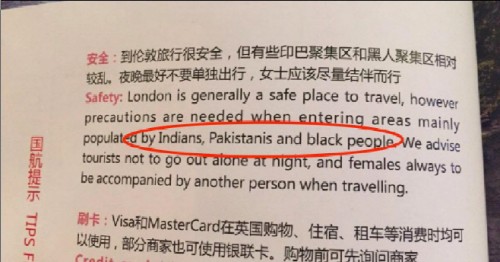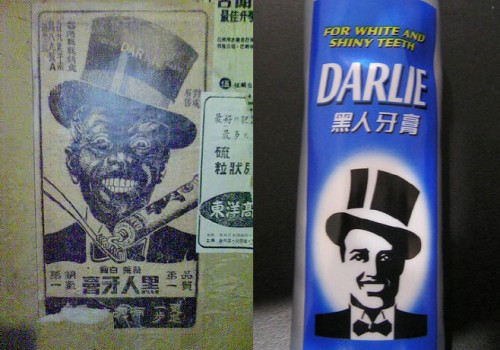By AsiaToday reporter Jisu Kim - One of the most talked-about topics among millennials in 2016 was the political correctness movement. The phrase 'politically correct' is commonly abbreviated to PC in the world of social media. Netizens often take to social media to argue about various issues, whether they are politically correct or not.
The term political correctness is a progressive social movement that advocates to choose value-neutral terms that avoid insulting or offending people who are subject to prejudice or discrimination on the basis of their gender, race, or ethnicity. In recent years, the meaning has expanded further to refer itself as an attitude of striving for value neutrality. Social networking sites are widespread nowadays, and public criticism is poured on those who are not politically correct.
Air China, one of China's state-run airlines, has experienced a rough time after its in-flight magazine Wings of China made the racist comment in a travel article on London. The article, printed in English, said: 'London is generally a safe place to travel, however precautions are needed when entering areas mainly populated by Indians, Pakistanis and black people. We advice tourists not to go out alone at night, and females always to be accompanied by another person when travelling.' CNBC producer Haze Fan tweeted a picture of the advice after reading the magazine while travelling, stirring heavy criticism from netizens. Blaming an "editorial mistake" by the magazine, Air China eventually apologized for 'inappropriate' remarks.
 Air China's in-flight magazine 'Wings of China' sparked a controversy over 'racist' guide to London./ Source: Twitter of Haze Fan (@hazeology)-CNBC Air China's in-flight magazine 'Wings of China' sparked a controversy over 'racist' guide to London./ Source: Twitter of Haze Fan (@hazeology)-CNBC |
The Wall Street Journal (WSJ) introduced a few more controversial cases of racial discrimination in China. Last May, a commercial for a Chinese laundry detergent that has gone viral was heavily criticized for being racist. The ad showed a black man being transformed into a porcelain-skinned Chinese guy after he was tossed in the washing machine with the soap. Qiaobi, the company behind the ad, announced it would stop the ad and issued an apology online. When the problem became bigger, the Chinese foreign ministry came forward and said the controversial ad is completely different from the position of the Chinese government, and that the government is consistent in equality towards and respects all countries, no matter their ethnicity or race.
 The Qiaobi detergent commercial showing a black man stuffed into a washing machine and transformed into a porcelain-skinned Asian stirred up racism controversy./ Source: YouTube The Qiaobi detergent commercial showing a black man stuffed into a washing machine and transformed into a porcelain-skinned Asian stirred up racism controversy./ Source: YouTube |
Still widely sold in China and Southeast Asia is the Taiwan-based Darlie toothpaste, in Chinese called 'heiren yagao', or Black People Toothpaste. The original name of the toothpaste was Darkie, and the packaging featured an image of a smiling black man in a top hat. To avoid racial misunderstanding, its English name was later changed to Darlie, and the image on the packaging was changed to show a racially ambiguous face in a top hat. However, the Chinese name of the brand still remains the same.
|
In December of last year, Victorian government in Australia encouraged its public officials to not use "heteronormative" terms such as "husband" or "wife" and instead use gender neutral terms such as "zie" and "hir" in a new guide. The document recommended using the word "partner" than wife/husband where the gender, sexual orientation, or relationship status of a person is unknown. Victorian Equality Minister Martin Foley said, "The government's responsibility is to keep people safe. The guide is one of the ways in which we are addressing and eradicating homophobia, biphobia and transphobia."
The debate over political correctness is not limited to the issue of racial discrimination or sex discrimination. For example, controversy has been rising in Asia regarding the celebration of the Christmas holiday. Istanbul Lisesi, a prestigious German-language high school in Turkey, created a big controversy by canceling Christmas last year. It sent an e-mail to German teaching staff, saying, "The topic of Christmas traditions and celebrations will not be discussed, taught or sung about, effective immediately, according to the notice by the Turkish management."
Some people think that it's better to use value-neutral expression "Happy holidays" instead of "Merry Christmas" because it's Christian-friendly greeting. Some even claim that we should avoid saying "holiday" because it stems from the Old English for "holy day" and use the expression "end of the year" instead.
However, as so many people have become very oversensitive about everything, there are also increasing number of people responding negatively to the political correctness culture.
Experts explain that the rise of populism around the world, such as Donald Trump's victory and Brexit, is led by people who are fed up with political correctness. Trump himself also wrote on Twitter, "So many 'politically correct' fools in our country. We have to all get back to work and stop wasting time and energy on nonsense!"
In an article entitled "Revolt of the Politically Incorrect", the Wall Street Journal explained, "When Donald Trump's mostly working-class voters repeatedly said that "he tells the truth", this is what they were talking about-not any particular Trump outrage but the years of political correctness they felt they'd been forced to choke down in silence."
Some point out that being PC is a kind of censorship. In his column as Guardian US writer, Dave Schilling said, "One of the millennials' favorite tools for enacting social change is Twitter, but there are those who see Twitter as yet another hotbed of censorship."
In New York magazine, writer Jonathan Chait claimed that the emphasis on "tone policing" and other attempts to tackle the biases inherent in certain forms of rhetoric is harming our right to free speech. "Social media, where swarms of jeering critics can materialize in an instant, paradoxically creates this feeling of isolation."
On the other hand, there are other people who claim that it's necessary to express uncomfortable feelings. In his article on local newspaper Malaysiakini back on May, Malaysian lawmaker Steven Sim Chee Keong referred to his experience of feeling uncomfortable while watching a stand-up comedy on his birthday, where a comedian kept making fun of a big woman for being fat. He emphasized, "We need intolerance, not tolerance."
#politically correct #PC #millennials #racism #populism
Copyright by Asiatoday
Most Read
-
1
-
2
-
3
-
4
-
5
-
6
-
7








 The Darkie toothpaste, featuring a smiling blackface performer as its logo, was sold for years in various parts of Asia as "Black Person Toothpaste". After racism controversy over the image, the toothpaste changed its English name from Darkie to "Darlie" with the logo changing to a smiling man of ambiguous racial background. In Chinese, "darlie" means "black person." The Chinese name of the brand still remains the same. / Source: Flickr
The Darkie toothpaste, featuring a smiling blackface performer as its logo, was sold for years in various parts of Asia as "Black Person Toothpaste". After racism controversy over the image, the toothpaste changed its English name from Darkie to "Darlie" with the logo changing to a smiling man of ambiguous racial background. In Chinese, "darlie" means "black person." The Chinese name of the brand still remains the same. / Source: Flickr 












